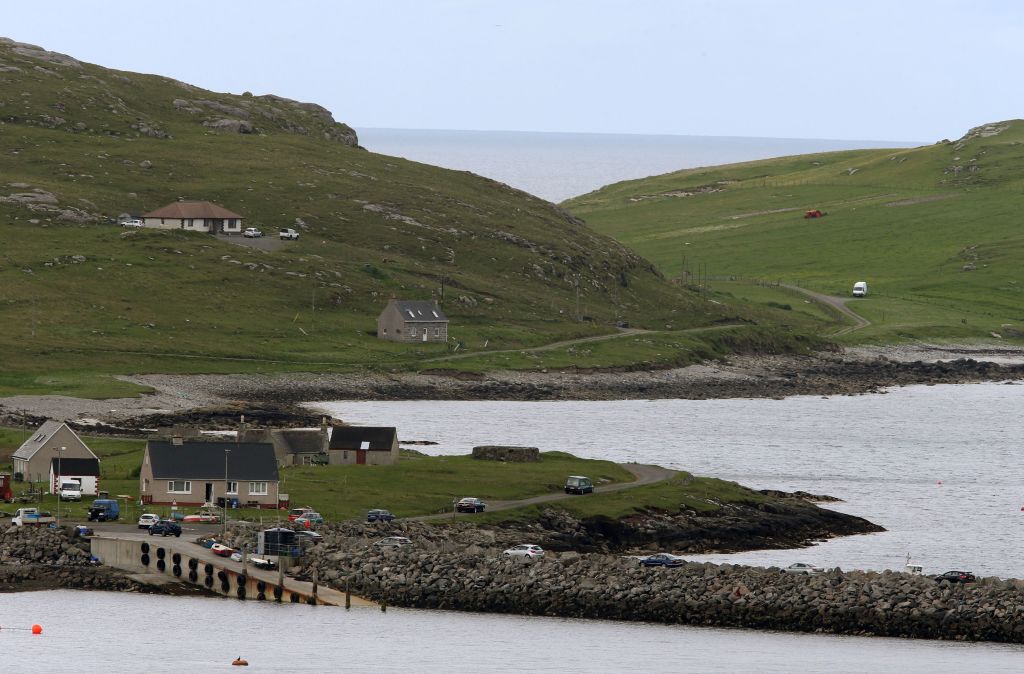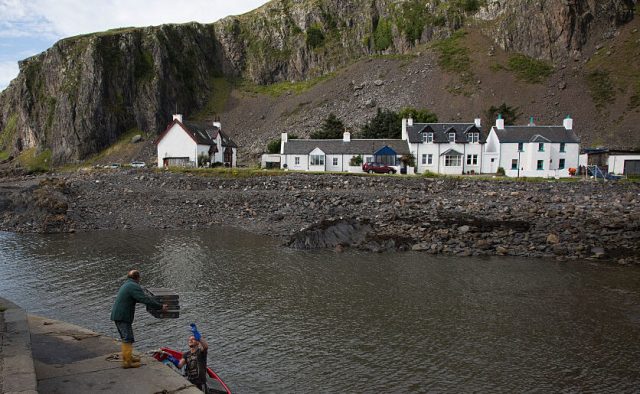Fishermen in Argylle and Bute (Colin McPherson/Corbis via Getty Images)

It’s half past midnight on the Isle of Benbecula — far, far away on the outer edges of Europe — and Angus Brendan MacNeil MP is getting into his stride. “If you want Scotland to stay, you should want Ireland back too,” he says with a glint in his eye, beer in hand, sure he’s got me this time. I hesitate, mistakenly, and so he ploughs on.
“Send Ireland back into poverty and depopulation like Wales and Scotland! Tell them they’ve got a Barnett formula and how lucky they are! That Limerick wouldn’t have that roundabout if it wasn’t for the Irish Barnett formula! Up the Union!” I concede, it’s a good point.
MacNeil is a crofter turned politician from an island 60 miles south of Benbecula called Barra — the last in the island chain variously known as the Outer Hebrides or the Western Isles, from where nothing but ocean lies to its West until you reach Labrador.
In this election he is standing as an independent — “an independent for independence on independence day”, as he put it — having been kicked out of the SNP last year after clashing with the chief whip, angry at the party’s failure to push hard enough for independence after Brexit. His main rival and the favourite to win the seat is a journalist friend of mine, Torcuil Crichton, one time Daily Record reporter turned Labour politician. Both are Gaelic speakers from the islands; only Crichton is a unionist who believes the British state can use its heft to improve people’s lives out here, particularly when it comes to the green energy revolution. “GB Energy” is, I realise, the first big-state, pro-Union policy to come out of Westminster in decades. Whether it will be enough to save the Union in the long term is less clear.
MacNeil’s point about Ireland is, to me, the central challenge for the British state today: does it even work? Look at any of the small countries that have either seceded or all-but seceded from their one-time masters. Are any of them doing worse than Scotland? How would “rejoin the United Kingdom” fare in an Irish referendum? We don’t talk much about the fact that Ireland left as the poorest part of these islands, only to become the richest today. For those like me who feel an emotional attachment to the Union, who feel British and would like Britain to remain, Ireland stands as a living, breathing challenge.

This is not a new challenge. In 1810, just nine years after the union between Britain and Ireland, the Irish unionist William Cuasck-Smith began worrying about the gaping divide between what he called the “theory and principle” of the union and the “vile system” of its administrative reality. “How have the promises made by Unionists to Ireland been kept,” he wrote to his friend J.W. Croker, the MP for Downpatrick. “Has a single step been taken to mitigate the evils which that arrangement was destined to reduce?… Has a step been taken to console the pride and soothe the exasperation of a country fallen from its high esteem? Can a Unionist avoid blushing when he contrasts the performance with the promise?”
Cuasck-Smith’s challenge remains to this day. Can the British state avoid blushing when it contrasts its performance with its promise? Back in Cusack-Smith’s day, the union was supposed to modernise Ireland, extending to its people all the apparent privileges of the English constitution, and in doing so, creating a new, unified people — a single nation stretching across both kingdoms. At the time of the union, the protestant Belfast News Letter urged people to get behind this new endeavour, aware that many of the Orange lodges across Ulster had only recently passed resolutions against the union. “However inimical some of the people of Ireland may have heretofore been to the adoption of that certainly awful, and most important, measure,” the paper’s editorial began, “it is now become an interest, as well as the duty of the whole… to consider the Empire, not as composed of distinct political bodies, each having views incompatible with the happiness and prosperity of the rest — but containing only one people, united in interest as in dominion.” It’s fair to say it didn’t work out like that.
What was so striking up in Scotland was that even though the threat of independence is fading in the short term — Brexit, ironically, having snookered the SNP — the reality is that the hope of “one people, united in interest”, no longer even seems to stretch across Great Britain, let alone Ireland as well. At a hustings on Benbecula on Monday night, I heard again and again complaints about Scotland’s resources being extracted by the English; Labour’s plan for GB Energy was dismissed as mere crumbs from a loaf that should be Scotland’s.
“It happened with the oil and it’s happening again with the renewables,” the SNP’s Susan Thomson told the audience. “Scotland is more than producing enough for its own energy needs… but the value from that doesn’t stay in Scotland, it leaves Scotland, it goes south of the border.” One woman in the audience chipped in: “We’re getting nothing back but drips.”
The facts tell a different story. On average, Scots receive around £2,200 more per head per year from the British state than the average Englishman. And that’s not because they pay more in tax either. In 2023, Scotland “extracted” £25.8 billion more from the UK state than it paid in — which works out at £4,735 per head, according to the Office for National Statistics. Scotland is the extractor, not England.
Yet, such arguments are about the worst you could make for the Union. I remember becoming frustrated listening to one esteemed MEP in the months after the Brexit referendum lamenting what she saw as the stupidity of the Welsh for voting to leave the EU when they were receiving so much money from Brussels in structural funds. I tried to make the counterpoint: not simply that the UK, as a whole, was a net contributor to the EU and so her argument was essentially circular, but that it was not unreasonable for people to vote against a system in which they were so poor they required large fiscal transfers just to make the status quo tolerable. People have every right to demand more than poverty alleviation from their political settlement.
And here is the point. Every region outside London and the South East is a net recipient of public spending today. The whole country — from Dover to Benbecula and across to Northern Ireland — is dependent on the economic wealth produced in one place: the capital. The British economy, in effect, is now a giant fiscal transfer union, dependent on London, which in turn is dependent on one part of London: the Square Mile. We are, in effect, Manhattan surrounded by Portugal, only without the weather or pasteis de nata.
And yet, people are not receiving a cheque on their doormat each year signed “from London, spend wisely”. Instead, all they actually experience in their lives is a dependence which, at best, cushions their seemingly relentless decline. “Our hospital used to work, but now it’s atrocious” one member of the audience in Benbecula told the panel of aspiring MPs on Monday. The chair of the debate that evening then set out the scale of the challenge facing the community. “Currently, you can’t have a baby on the island,” she said. “You can’t have chemotherapy on the island. You can’t have minor surgery, you can’t have a vasectomy. You can’t have any of the small minor surgery interventions that you used to be able to have.”
This is not unique to Benbecula, or even Scotland, but is playing out across the UK where services are noticeably deteriorating. My own grandmother was on the receiving end the other day, woken up at 3am by a telephone call from the hospital who had looked at her blood tests and decided she had to come in immediately, only to then make her wait for 15 hours, alone, before failing to give her the treatment she needed because the doctors changing shifts had not handed over correctly. Everyone now has stories like this.
I used to think that the difference between Right and Left in politics was that, at heart, the Right believed Britain was fundamentally too poor and so needed to prioritise economic growth, while the Left believed it wasn’t a question of wealth but of distribution, and so needed to prioritise public spending. The radicals on either side believed in major structural reforms to fix these problems, while the moderates simply concluded small technocratic changes would be enough. Today, though, there seems to be a consensus emerging that Britain is both too poor and too unequal and that small technocratic tweaks will not be enough.
Today, we pay more tax for less in public services, with record levels of immigration for record low growth, all papered over by ever more dependence on London, which only produces ever more resentment of the capital and those who live in it. Angus MacNeil is right that defending this system because we have a Barnett formula is not enough. Limerick, after all, has plenty of roundabouts that the Irish pay for themselves.
In one sense, the Union is the safest it has been since the Brexit vote in 2016. With that issue fading from memory and the other great destabilising force, the Tories (also known as the Conservative and Unionist Party), also seemingly on their way out, the structural threats are receding. The real point, though, is that countries can thrive with independence, devolved self-rule or within larger well-governed countries. But unless they think of themselves at some level as a place containing “one people, united in interest as in dominion”, as the News Letter once put it, they will always be vulnerable. Barnet is not enough. Scottish nationalism was born in the era that oil was discovered. Suddenly, it was Scotland’s oil not Britain’s. In the end, of course, it would be Shell’s, which rather sums up the problem.
Visit Benbecula today for a similar fable of modern Britain, where even the English I met on the island are now for independence. Here is a place on the edge of Europe where the British state was once present, building things and employing people. The island’s biggest village is called Balivanich, formerly home to a few rows of cheaply built military accommodation to serve the nearby MOD missile testing site. What has now happened to that site? It has been sold off to a company called Qinetiq which now runs the place from Hampshire. Who today does not blush at this reality?
***
Listen to Tom’s podcast report here: Has the SNP blown it?










Join the discussion
Join like minded readers that support our journalism by becoming a paid subscriber
To join the discussion in the comments, become a paid subscriber.
Join like minded readers that support our journalism, read unlimited articles and enjoy other subscriber-only benefits.
Subscribe